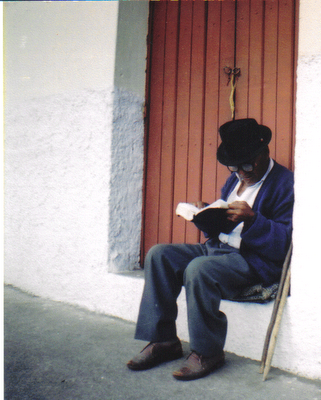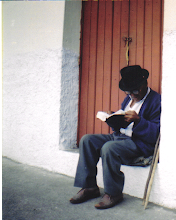Another Witness

He sat in a doorway with a book just a few inches from his face. We’d seen him before on the streets struggling to walk with a cane in each hand. The arthritis in his knees must have been awful. There was also something familiar about the book he was reading. Although the title on its blue cover had faded, its thickness and size reminded me of an older copy of the
Book of Mormon.
But the man’s focus as he read made me secondguess myself. We’d never seen the man at church, and old people in Cayambe, Ecuador generally didn’t talk to Mormons, let alone accept and read one of our books.
"Elder Pankratz," my companion said. "I think he’s reading the Book of Mormon."
"Yeah, let’s talk to him," I said.
He didn’t flinch when I said hello. But when he looked up, I wondered how he could even see me. Thick cataracts covered most of both his eyes, and a piece of string tied around his head held old black glasses with thick lenses on his face. But we were right; he was reading from
Mosiah.
"What?" he asked.
"Are you enjoying that book?" I asked.
"This book talks about God, and I like it," he answered.
"That book’s from our church," I said.
"What?"
"That book’s from our church," I said, trying not to yell, "and we’d like to talk to you about it."
"Young man, I am a member of the apostolic, Roman Catholic Church. I was born Catholic, and I’ll die Catholic."
I tried to talk more to him, but he couldn’t hear me. We left, and he returned to his reading with the same fervor as before.
The Invitation
As a missionary, my first meetings with those who wanted to learn more about my Church always ended by reading with them the promise given by Moroni in the last chapter of the Book of Mormon (see
Moroni 10:3-5). I wanted so badly for them to know it is true. While that promise is essential to gaining a testimony of the Book of Mormon, I wish I would’ve taught more about Christ’s invitation to the inhabitants of ancient America
when He first appeared to them because knowing the Book of Mormon is true is merely a step in knowing Jesus.
At the temple in the land Bountiful, Jesus said:
Arise and come forth unto me that ye may thrust your hands into my side, and
also that ye may feel the prints of the nails in my hands and in my feet, that
ye may know that I am the God of Israel, and the God of the whole earth, and
have been slain for the sins of the world.
One by one, each person came to Jesus and received a perfect witness of His divinity and redeeming love (
3 Nephi 11:14-15).
But Christ’s invitation wasn’t just for the people at the temple in the land Bountiful. It extends to us today. And it can only be accepted through the Book of Mormon.
Helped to Accept
My parents helped me accept Jesus’ invitation when I was eight years old, but not because I was an angel child. After numerous threats to kill myself or to run away and many expressions of hatred, my parents didn’t know what to do. It had gotten so bad that, before I was
baptized, my dad called me to the office he used as the manager of a Church farm and told me that he didn’t know if I was ready to be baptized. It wasn’t a formal meeting. He was sitting at his old IBM computer, and I stood in the doorway, not wanting to step onto the office’s cold, cement floor with my bare feet.
But I was baptized even though my behavior didn’t change, and sometime thereafter, my parents came home from Salt Lake with a present: my own copy of the Book of Mormon. I don’t remember why, but I started reading it. And things started happening. I made less threats, said "I hate you!" less often.
Feeling the Prints
More important, however, than the way it affected my behavior, the Book of Mormon brought me to Jesus and gave me a perfect witness that He is my Savior. Unlike the people in the land Bountiful, my witness of Jesus Christ came gradually. As a nine-year-old, I didn’t understand much of what I read, but I loved the stories of the Book of Mormon: Nephi getting the Brass Plates (
1 Nephi 4), Ammon defending the flocks of King Lamoni (
Alma 17), Enos praying all day and all night (
Enos 1), and Captain Moroni defending liberty at all costs (
Alma 43-62). But my favorite story was when Jesus healed the sick and blessed the children at the temple in the land Bountiful (
3 Nephi 17).
What I didn’t realize was that He had begun blessing and healing me.
As a teenager, I wept with Jesus when I contrasted the way the people of ancient America treated Him with the way that the Jews had treated Him a short time before. In Jerusalem, most people couldn’t wait to get rid of Him, but in Bountiful, all wept when they thought Jesus was leaving. In Jerusalem, Jesus experienced rejection and hatred from those He longed to heal. Perhaps He felt that His sacrifice was in vain. In Bountiful, everyone rejoiced and came to Him. And His joy was full to see that His sacrifice had saved so many (
3 Nephi 17:20).
As I continued to read, the Book of Mormon taught me the doctrine of the
Atonement, and my love for Jesus grew. Through it, I felt God’s perfect love that He would send His Son as a willing sacrifice and Jesus’ love that He would condescend below me to lift me to eternal life. I recognized that Jesus answered the "ends of the law" (
2 Nephi 2:5, 10) for me when He drank the "cup of the wrath of God" and suffered the pains of the damned (
Mosiah 3:25-27). He saved me from suffering the same, and I longed to be "clasped in the arms of Jesus" (
Mormon 5:11).
And my responsibility in the
Plan of Salvation became clear. I would need "faith unto repentance" (
Alma 34:17). And if I didn’t repent, then Jesus would not be able to save me "for except it were for [the conditions of repentance] mercy could not take effect except it should destroy the work of justice" (
Alma 42:13). And repentance became more than stopping bad behavior; it became the means whereby my will could be "swallowed up in the will of the Father" (
Mosiah 15:7) so that I could "follow [Jesus], and do the things which [I] had seen [Him] do" (
2 Nephi 31:12), including being baptized, receiving the Holy Ghost, and obeying the Father’s commandments. Without such submission, Jesus would not have power "to redeem me from my sins" (
Helaman 5:11) because He would not force me to partake of salvation (
Alma 42:17).
Truly Jesus has "answered the ends of the law, unto all those who have a broken heart and a contrite spirit" (
2 Nephi 2:7). And there is not "any other way nor means whereby salvation can come unto the children of men" (
Mosiah 3:17).
He has paid the price of sin and will save us if we let Him!
Today, I marvel that Jesus did not only suffer for my sins but for my "pains and afflictions and temptations . . . ; [and my] sicknesses . . . , that his bowels [would] be filled with mercy, according to the flesh, that he may know according to the flesh how to succor [me] according to [my] infirmities" (
Alma 7:11-12). It is beyond comprehension that, as I suffer, I do not suffer alone. I testify that Jesus will succor us. I have had experiences too numerous and too sacred to mention when, after I had felt ready to surrender to the trials and afflictions of life, Jesus comforted me and whispered that all would be well.
I know that Jesus Christ lives and is the Savior of my soul. Although I have not seen Him, I long for the day when I will kneel before Him. But through the Book of Mormon, I already know Him. If the veil were to part today and I were to thrust my hand into His side and to feel the prints of the nails in His hands and in His feet, I would not know any more than I do today that Jesus is the Christ, the Son of the living God because I have, in a very real way, felt the tokens of His Messiahship through the teachings of the Book of Mormon.
Arise and Come Forth
And all may know Jesus in a powerful, perfect way. His invitation to the Nephites and Lamanites extends to you and to me today. But we must answer His call. We must "shake off the chains with which [we] are bound, [even the chains of sin], and come forth out of obscurity, and
arise from the dust" (
2 Nephi 1:23, emphasis added). And we have the Book of Mormon and its fullness to help us. Will you read it and search it and find the fulness therein? If you do, I testify that you will find Jesus standing "with open arms to receive you" (
Mormon 6:17). He knows you. "He has borne [your] griefs and carried [your] sorrows . . . ; and with his stripes [you can be] healed" (
Mosiah 14:4-5).
Even though that old man in Cayambe couldn't listen to us, he was still answering Jesus’ call, and I don’t worry too much about him. Anyone who reads the Book of Mormon with the same energy and fervor as he will receive all the blessings that it offers. Perhaps after the shackles of age and infirmity release him and after I finish my work here on Earth, we will meet again and rejoice together as we share with each other our love for the Book of Mormon because it will have brought us both to Jesus.
For a free copy of the Book of Mormon, click
here.
To invite missionaries from the Church of Jesus Christ of Latter-day Saints into you home, click
here.

